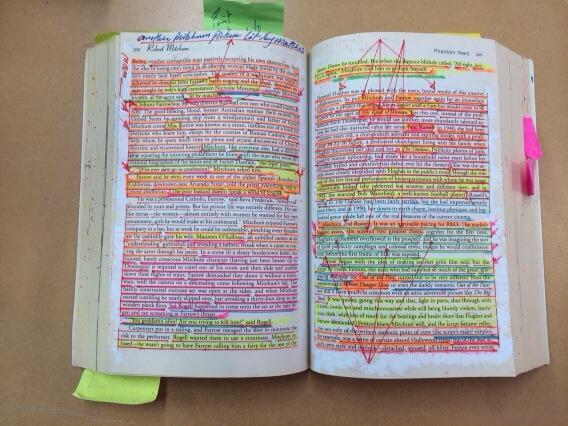You’ve seen me before putting together the most disparate things, while keeping a straight face and a serious tone. So here’s a quote excised from a review of an anime about “magical girls”:
I’ve always been fascinated with the idea of using animation – and paintings, and music, and words, and etc. – to paint not so much the reality of the world, but the essence of it. If we want to see what something truly looks like, we have pictures and video that can do that, but a Van Gogh still holds up because it shows the world as perceived through the artist’s mind. Enzo once referred to Shinkai Makoto’s work as “more real than real”, and it certainly is in the way he meant it, but to me that phrase has always most resonated when an artist deliberately paints the world not as it appears, but how it is. The truth behind it, not just the reality that we see.
If I manage to write a review of “A Dream of Wessex” by Christopher Priest you’ll see how I’m following a red line of mythological journey, across many mediums, cultures, religions, philosophies and so on. That quote is very pertinent.
The basis, or the structure, of this discussion is what I wrote in “The Throne of the Soul” recapitulation. But already in this quote here you should recognize the important element: Cartesian dualism. He describes two ideas, one is the world as “it appears”, and one is the world as it is revealed through “art”.
What’s interesting in that quote is how he makes the fundamental error of inverting the scheme. He makes the distinction between the reality of the world and its essence. And he turns the “more real than real” into the world as it appears and the “truth” behind it.
What is “art” if not “interpretation” of the real? In my partial analysis of Tolkien’s mythology I examined the part about how art is often seen as a god-like creation. The desire to be like the creator. Tolkien explains this as a natural instinct built into human beings. But this deliberate act of creation should be considered as artificial, not natural (or “true”). We do not take the world as it is, we take the world as we want it, reshaping it.
Where do human beings dwell? If “Reality” is out there, then it’s almost impossible for us to reach it. There’s a membrane we aren’t able to breach. Plato’s cave. But for us, living on “this other side”, reality is made of meaning. Of patterns, symbols. To live and understand reality we rebuild it in a form that makes sense to us. This produces an heightened sense of truth. It’s not “deeper”, it’s somewhat heightened. The “truth” behind the apparent reality reveals the truth of the human condition. Not universal truth, or objective, scientific truths, the world out there. It’s the world “in here”, the one you get caged in your head. The one you live in.
A writer, painter or musician, creates a world through a series of signs. This becomes a secondary, separate dimension. With its rules that must usually be consistent. Characters immersed in that world will have to shape their model of reality, interpret things happening around them. They might be poets, musicians, painters. In a delicious recursive self-reference.
All of this features prominently in Malazan, for example. The post-modern aspect is about the “awareness” of the context. Not of the “ceiling of the world”, meaning the boundaries of the artistic creation, but of the interplay of self-reference. Of the writer writing, of the context that contains the created world.
In Malazan this often creates a delicious, playful interplay filled with double-meaning. A scene can be entirely consistent with the level of plot and artistic “sealed” world. And yet it can still be “aware” of where it comes from. Of the “truth” behind the magical trick. Of the writer writing.
This is a scene from “The Bonehunters” that I bet Steven Erikson had lots of fun writing:
Things were not well. A little stretched, are you, Ammanas? I am not surprised. Cotillion could sympathize, and almost did. Momentarily, before reminding himself that Ammanas had invited most of the risks upon himself. And, by extension, upon me as well.
The paths ahead were narrow, twisted and treacherous. Requiring utmost caution with every measured step.
So be it. After all, we have done this before. And succeeded. Of course, far more was at stake this time. Too much, perhaps.
Cotillion set off for the broken grounds opposite him. Two thousand paces, and before him was a trail leading into a gully. Shadows roiled between the rough rock walls. Reluctant to part as he walked the track, they slid like seaweed in shallows around his legs.
So much in this realm had lost its rightful … place. Confusion triggered a seething tumult in pockets where shadows gathered.
I’ve mentioned before, and now is likely public knowledge, that both Ammanas and Cotillion are sometimes used by Erikson to play with this post-modern layer. On the explicit level that quote is consistent with characters and the world, but from my point of view it reads like playful meta-commentary on the writing itself, especially at that point of the overall series.
Maybe Ammanas and Cotillion “roles” are inverted, but this is the book where Erikson has to pick up all the threads he left behind after five volumes. It’s the first real “convergence” on the series as a whole. So, “a little stretched, are you” reads like something Erikson is telling himself, after all that came before and the monumental task still ahead. “The paths ahead were narrow, twisted and treacherous. Requiring utmost caution with every measured step.” This is again the description of where he’s at, writing the story. Meta-commentary on writing the series, self-reflection.
“Ammanas had invited most of the risks upon himself. And, by extension, upon me as well.” This is also the point in time when Esslemont started to publish his own side of the series. So again, it works as meta-commentary. On the sharing of ambitions, and risks.
“So much in this realm had lost its rightful… place.” This may be again about all the things that changed in the course of five volumes. Both in the story and outside it, I guess.
“So be it. After all, we have done this before. And succeeded. Of course, far more was at stake this time. Too much, perhaps.” And here the determination to do it regardless of risks. You definitely can’t hesitate when you’re about to start writing the sixth volume of a ten volumes planned series.
The Shadow realm itself, where Cotillion and Ammanas reside and “scheme”, has similar metaphoric qualities:
Emerging from Shadowkeep, he paused to study the landscape beyond. It was in the habit of changing at a moment’s notice, although not when one was actually looking, which, he supposed, was a saving grace.
It has this dream-like quality. A sort of WYSIATI (What You See Is All There Is). Until things aren’t seen, they lurk in shadows, indistinct. Writing is the same. You put signs on a page. Until those signs aren’t written, nothing exists. And nothing else exists outside what is written. What You Write Is All There Is. The Observer makes reality. The realm of Shadows and Illusions. The illusion of creation.
But then again this treacherous landscape can also concretely refer to the writing itself. Something you are writing may be working well while you are at it. It seems clear, with all the details in your control. But when you are juggling so many different characters and plots, things have a tendency to slip out of control while “you’re not looking” and busy working on some other part. And so the struggle to keep it all together, as if “looking everywhere at the same time”.
“Confusion triggered a seething tumult in pockets where shadows gathered.” This seems describing almost a rebellious behavior of the realm. The moment your grasp slips, the shadows start swarming, threatening what was certain just before. The shape of things. As if you lower your guard, uncertainty devours everything. Including the writer self-doubt. It’s an hostile realm. Cotillion and Ammanas are “usurpers”.
Finally, earlier I saw this link about an interview with David foster Wallace. And in it there’s another link to a different chunk of the interview that I find particularly interesting. DFW also was obsessed about self-reference. This part:
Whereas Cantor, yeah, codifies the transfinite, but Cantor’s paradox is the first step into Godel’s incompleteness and self-reference. It’s at once this beautiful climax of the two hundred years before it and the first note of the funeral dirge for math as something that you can just, ‘You know what, we can explain the entire universe mathematically. All we have to do is come up with the right axioms and the right derivation rules.’ I mean, Cantor’s paradox starts the wheel of self-reference.
I don’t know if you know much about Godel’s incompleteness theorem. But in a lay sense, Godel is able to come up mathematically with a theorem that says, ‘I am not provable.’ And it’s a theorem, which means that math is either not consistent or it’s not complete, by definition. Packed in. He is the devil, for math.
Cantor’s paradox, that whole ‘If it’s not a member of the set, it is a member of the set,’ and then Russell’s paradox about twenty years later, those were the first two . . . You know, when you start coming on a really interesting theme in a piece of music, you usually hear it in echo notes that foreshadow it, those are the foreshadowings. And I don’t imagine Godel would have come up with the self-reference loop if it hadn’t been for Cantor and Russell. [Sotto voce] Whatever. You’re not interested.
“You know, when you start coming on a really interesting theme in a piece of music, you usually hear it in echo notes that foreshadow it, those are the foreshadowings.” That’s a nice description of what I’ve been doing, in my reads and this post too. I’m following this red string that links all these disparate things. It doesn’t matter from which angle you start, because everything leads to everything else.
[Sotto voce] Whatever. You’re not interested.


 Oh, True Detective, HBO. Singular masterpiece on TV now.
Oh, True Detective, HBO. Singular masterpiece on TV now.